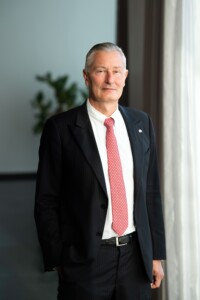
Switzerland’s Economy in High-Inflation Eurozone
As many countries across the globe continue to battle high inflation, the rise in prices has been far less dramatic in Switzerland. In 2022, inflation in Switzerland hit a 29-year high of 3.5%. While still high by Swiss standards, it’s much lower than rates in the United States, the United Kingdom, and the Eurozone. As one of the wealthiest countries in the world, Swiss citizens are generally less impacted by price rises, as they tend to spend a lower proportion of their income on essentials versus discretionary items. In addition, factors such as the stability of the Swiss franc, a resilient energy supply, and stringent price controls on goods and services which makes them less susceptible to inflation-led fluctuations. Of the core products used to measure inflation in the Eurozone, including food, housing and transport, almost one third (30%) are subject to price regulation in Switzerland — more than in any other European country.
Geopolitics Impacting Switzerland
There are ongoing concerns about the strength of the Swiss economy due to evolving and unfavorable economic and geopolitical conditions globally. When Sweden and Finland submitted their official requests to join NATO on May 18, 2022, it was a historic departure from their neutrality policies and a clear sign that the invasion of Ukraine was redrawing Europe’s security framework. Switzerland is now contending with complex national security and legislative dilemmas.
Switzerland as America’s Economic Trading Partner
The United States of America is a significant partner for Switzerland in all respects. In 2019, Switzerland was the sixth largest foreign investor in the United States, investing USD 298 billion. In 2020, Switzerland imported goods worth CHF 19.8 billion from the U.S. and exported goods worth CHF 68.8 billion. In 2019, almost 1,100 US companies were operating in Switzerland, employing just under 100,000 people. Approximately 500 companies operate in the United States, creating close to 300,000 jobs.
Join the World Affairs Council of Charlotte for a WACC Ambassadors Circle Series on Wednesday, May 24, 2023, with H.E. Jacques Pitteloud, Ambassador of Switzerland to the United States. He will address Switzerland’s economic strength, its diplomatic and economic ties to the United States, and its role in helping manage regional security challenges in Europe.
Program Information:
Date:
Wednesday, May 24, 2023
Check-In and Pre-Lunch Networking:
11:30 a.m. – 12:00 p.m.
Lunch & Presentation:
12:00 p.m. – 1:30 p.m.
Location:
Charlotte City Club Directions to the parking garage (set your GPS to 116 W. 4th Street, Charlotte, NC 28202)
Cost:
$50 (WACC Member Rate)
$65 (Non-Member Rate)
$35 (WACC Student Member / Educator Member / YPWACC)
- Please call 704-687-7762 for credit card payments over the phone.
- Checks can be mailed to “World Affairs Council of Charlotte, 9201 University City Blvd., CHHS 227, Charlotte, NC 28223.
Biography:
Jacques Pitteloud was appointed as Ambassador of Switzerland to the United States of America in 2019.
Ambassador Pitteloud was born on November 12th, 1962, in Zurich, Switzerland He joined the Swiss Foreign Service in 1987, being first assigned as an Advisor to the Foreign Minister. From 1988 to 1989, he served as a trade attaché at the Swiss Embassy in Riyadh, Saudi Arabia. From 1990-1995, he served in the Swiss Strategic Intelligence Service. Following his service there, he acted as a personal advisor (General Staff matters and Intelligence) to two successive Defence Ministers until 1999. In 1999-2000, he served as the Head of a Study Group tasked to develop the future structures of the Swiss Armed Forces.
After having been a witness of the Rwanda Genocide in 1994, Dr Pitteloud created an organization dedicated to the task of hunting down and bringing to justice the perpetrators and he managed to have several of them prosecuted both by the international as well as domestic courts. Dr Pitteloud then served as the first Intelligence Coordinator for the Swiss Government from 2000 to 2005: this function entailed drafting intelligence requirements for the executive, overseeing the drafting of strategic assessments on security-relevant topics, coordinating the work of the various intelligence services as well as of law enforcement and analysis agencies.
He then became the Director, Arms Control, Disarmament, Security Policy and Intelligence at the Ministry of Foreign Affairs in Bern. For the duration of his tenure, Ambassador Pitteloud also headed the Swiss Delegation to the Holocaust Remembrance Alliance. From 2010 to 2015, Jacques Pitteloud was Swiss Ambassador to Kenya, Uganda, Rwanda, Burundi, Somalia and the Seychelles. He was instrumental in initiating and supporting various civil society initiatives as well as conservation programmes. Dr Pitteloud was also involved in a series of mediations in the region.
Jacques Pitteloud was Director General of the Swiss FDFA from September 2015 prior to being appointed as Swiss Ambassador to the United States in September 2019. As a Director General, he oversaw a budget of USD 3 Billion and was responsible for Human Resources of a 5400-FTE Organization. His tasks also entailed running IT and communications for the whole Ministry as well as heading the legal and translation services. The Director General was also responsible for the management of all FDFA buildings both in Switzerland and abroad.
Dr Pitteloud earned a Master’s Degree and a Ph.D. from the Law School at the University of Zürich (Master 1986, PhD 1987). Following his assignment in the Middle East, he graduated from the International Training Course in Security Policy (ITC) at Geneva University. He is a retired lieutenant colonel (General Staff) in the Swiss Armed Forces and was the commander of a Mechanized Infantry Battalion. A passionate bird photographer, Jacques Pitteloud has published his pictures in several books and publications in Kenya and South Africa.
Ambassador Pitteloud is married and father of a daughter. He speaks French, English, German, Swiss German, Italian and Spanish fluently and he has a basic knowledge of a few other languages.



